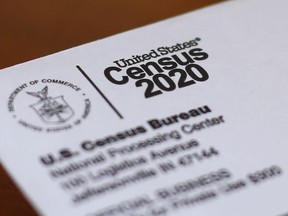Article Author:
Associated Press
Mike Schneider

We are calling for the controversial investigation to be stopped. The way survey and census participants' confidentiality is protected is jeopardizing the usefulness of the numbers that underpin the nation's data infrastructure, it said.
The Census Bureau first adopted the use of differential privacy algorithms when the first round of 2020 Census data was released last year. These figures were used not only to determine the number of seats in Congress each state would win, but also to redraw the electoral districts in his one-degree process during his decade, known as re-election. rice field.
In a letter to Census Director Robert Santos, demographers and other researchers wrote that the agency will use the algorithm in two of his other key data releases in the future. I am asking you to cancel the plan. Annual population estimates are used to allocate $1.5 trillion in federal funds each year. The American Community Survey provides the most comprehensive data on life in the United States by asking about commute times, internet access, family life, income, education level, disability, military service, and employment.
Privacy protection methods are “inappropriate for highly sensitive data sets. , and for equity in the planning of government services of all kinds," the letter said.
The Census Bureau states that differential privacy algorithms are needed. Because, without differential privacy algorithms, readily available third-party data would grow, combined with modern computing, to allow hackers to piece together the identities of census participants, allowing surveys to break the law. According to statistical agencies, previous protection methods are no longer effective.
Last year, a panel of three federal judges refused to stop the Census Bureau from using the algorithm after the state of Alabama challenged its use in a lawsuit.
Census consultant Terry Ann Lowenthal said the letter was "in light of new efforts to protect confidentiality in the modern world, the Census Bureau The data reflect significant concerns about whether the data will continue to be useful."
"Because the concerns are so central to the Agency's mission, we are confident that agency leaders will take them seriously and find acceptable solutions based on meaningful stakeholder engagement." I am,” said former parliamentary staffer Lowenthal. A person who specializes in the census.
This letter was led by members of the Steering Committee of the Federal State Census Cooperative, which promotes cooperation and communication between the Census Bureau and state agencies responsible for census taking. Its members began collecting letter signatures from other researchers last week and plan to submit letters to Santos in the coming weeks.
Differential privacy algorithms to obscure the identity of certain participants. This is most noticeable in the smallest geographies such as census blocks. For the next Census in 2030, demographers recommended using other methods to protect confidentiality, such as combining blocks with a small number of people.
Some of the detailed data published in previous Censuses were not published at the lowest geographic level, and efforts to apply algorithms have reduced the The round's publication was delayed until next year, almost two years after it should have been released, the letter said. It will be outdated by the time it is published," it said.
Andrew Beveridge, emeritus professor of sociology at the City University of New York, said at a joint statistical conference in Washington last weekend that private data providers were "pigging down." and is ready to fill the gap. He feels that the Census Bureau data cannot be used. This could lead to the privatization of the US statistical infrastructure, he said Beveridge in a presentation at North America's largest gathering of statisticians and data users.
In his letter, the demographer argued that the Census Bureau's credibility was at stake, stating, "Experiences over the past few years have undermined user confidence in the Census Bureau. ' said.
Last month, at a conference on differential privacy hosted by the National Academy of Sciences, Santos was asked about the possibility of reverting to previous methods of confidentiality.
"I understand where you are coming from. I feel your pain," Santos said.
——

Sign up to become a division of Postmedia Network Inc. Receive daily top stories from a National Post.
Thank you for registering.
Sending welcome email. If you don't see it, please check your spam folder.
The next issue of NP Posted will arrive in your mailbox shortly.


